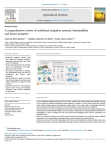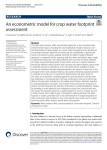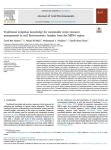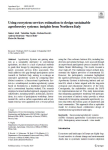Catégories
Documents disponibles dans cette catégorie (3512)
 Ajouter le résultat dans votre panier Affiner la recherche
Ajouter le résultat dans votre panier Affiner la recherche
Article
Soil health is essential for sustainable and resilient agricultural systems, supporting food production and maintaining vital ecosystem services. In the Mediterranean region, including Tunisia, it is seriously threatened by both natural and anth[...]
Article

Article
J. Ahmad ; Y. Wang ; L. Zhang ; W.U.H. Shah ; R. Yasmeen ; H.S.K. Pathiranage |Climate change significantly impacts global agricultural productivity, making it essential to examine its precise influence on production efficiency. This study evaluates the impact of climate change on agricultural production efficiency among t[...]
Article
Crop yields are increasingly threatened by intensifying droughts in southern Europe, yet the long-term, spatially explicit quantification of yield response to agricultural drought remains limited. Remote sensing can address this gap by providing[...]
Article
Under drought conditions, the growing demand for irrigation water, coupled with its declining availability, poses serious risks to agricultural productivity. Meanwhile, European farmers operate within a policy framework that requires the agricul[...]
Article
Context Traditional Irrigation Systems (TIS) are ancient, complex hydro-social systems that entangle a network of socio-technical-ecological relationships, having endured for centuries. TIS faces threats from rural desertification, climate chang[...]
Article
W. Leal ; J.M. Luetz ; M.A.P. Dinis ; G.J. Nagy |The Mediterranean region accounts for nearly 95% of global olive oil production. However, climate change-manifesting in intensified heatwaves, prolonged droughts, and increased pest prevalence-is undermining both the quantity and quality of yiel[...]
Article
F. Valenti ; M. Bustamante ; G. Mancuso ; A. Toscano ; J. Zhuang ; D. Zilberman ; W. Liao |This study applied a three-step approach, data collection and sorting, GIS-based analysis, and technical analysis to evaluate the food, water, and energy systems in Europe. It explores a FEW nexus solution based on maize, wheat, and rice product[...]
Article
M. Yaseen ; A. Pagano ; R. Giordano ; S. Vanino ; S. Fabiani ; V. Baratella ; V. Iacobellis ; A. Izzaddin ; I. Portoghese |The “Nexus” concept has emerged as an effective approach to natural resources management, that integrates management and governance across sectors and scales, emphasizing the need to consider interconnections and interdependencies among multiple[...]
Article
Social capital plays a crucial role in rural communities' adaptation to climate change, with bonding, bridging, and linking ties serving distinct yet complementary functions. While their positive influence in responding to sudden-onset events-su[...]
Article
A.E.K. Vozinaki ; I.V. Anyfanti ; G.P. Karatzas ; E.A. Varouchakis ; C. Ceseracciu ; G. Branca ; R. Deriu ; P.P. Roggero ; I.D. Çetinkaya ; C.I. Aydin ; N. Copty ; S. Jomaa |Competing demands from agriculture and tourism place significant strain on water governance in Mediterranean regions, highlighting the need for more inclusive and adaptive management strategies. This study examines participatory water governance[...]
Article
Agricultural carbon emissions within the European Union present complex systemic challenges requiring integrated approaches that balance environmental objectives with food security imperatives. This study examines systemic drivers of carbon emis[...]
Article
A. Martella ; F. Pietrangeli ; E. Biagetti ; B. Pancino ; S. Franco |The aim of this paper is to enhance the well-being of marginalized areas by improving their local economy, considering the correlation between socioeconomic marginalization and environmental sustainability. These two objectives are at the core o[...]
Article
Climate change is forcing a fundamental revision of water management in agriculture, particularly in Mediterranean viticulture. In Italy, rising average temperatures, irregular rainfall patterns, and the frequent occurrence of extreme events are[...]
Article
R. Pergamo ; L.A. Folino ; M. Ferrigno ; M. Furini ; M. Hamam ; V. Manganiello ; A. Manzoni ; A. Pesce ; B. Rocchi |Safeguarding water resources has become a strategic need to maintain the viability of agricultural operations, which are significantly reliant on water accessibility. The urgency of this requirement is amplified by the manifest effects of climat[...]
Article
L. Jallal ; S. Er-Raki ; S. Khabba ; J. Ezzahar ; O. Kaissi ; Z. Rafi ; A. Chehbouni |This study aims to calibrate and validate the AquaCrop model to accurately simulate key growth parameters of pea crops in the semi-arid Chichaoua region of central Morocco. It specifically targets, canopy cover (CC), actual evapotranspiration (E[...]
Article
A.A. Fernandes-Silva ; A. Ben-Gal ; R.D. Miranda Fernandes ; R. Gucci ; B. Imrak ; D.K. Andima ; T.A. Paço ; O. Garcia-Tejera |Water productivity (WP) in olive orchards is crucial for sustainable agriculture, particularly in water-scarce Mediterranean regions affected by climate change. This review examines strategies to improve WP, including deficit irrigation (DI), se[...]
Article
H. Ghazouani ; D. De Caro ; M. Ippolito ; F. Capodici ; G. Ciraolo |Climate change and water scarcity are major threats to the sustainability of wheat production in Mediterranean regions. Thus, timely and reliable water demand assessments are crucial to drive decisions on crop management strategies that are usef[...]
Article
E. Lopez-Pérez ; J. Manzano-Juarez ; M.A. Jiménez-Bello ; A. García-Prats ; C. Sanchis-Ibor ; A. Rubio-Martín ; F.Z. Boubekri ; A. Kajji ; P. Tufoni ; L.M. Nunes ; M. Pulido-Velazquez |Irrigated agriculture in Mediterranean semi-arid regions is increasingly constrained by aquifer depletion and climate change. Enhancing water use efficiency in the irrigation of perennial crops is essential for long-term agricultural sustainabil[...]
Article
V. Niccolucci ; M.M. Kemda ; M. Marchi ; G. Cai ; C. Montefrancesco ; S. Parri ; A. Di Noi ; E. Alberti |The Italian wine industry, while economically significant, is also associated with environmental impacts, including the over-exploitation of water resources and the deterioration of water quality. As a result, water management has become an incr[...]
Article
Water diplomacy provides a way to manage shared water resources through inclusive, cooperative, and flexible methods. In the Nile Basin, the Grand Ethiopian Renaissance Dam (GERD) has become a key point of regional tension. It highlights the com[...]
Article
The applied literature on the MENA region remains fragmented between studies focused on the economic determinants of agricultural value added and climate and agriculture analyses via food security, without jointly assessing productive and climat[...]
Article
A.S. Hegab ; M.M.A. Wahab ; E.E. Hammad ; Y.N. Ahmed ; A.A. Khalil ; B.A.A. Ali |A WATER scarcity is one of the detrimental consequences of climate change reflected in agricultural productivity. The primary focus of this study is to investigate the profitability of maize production for smallholder farmers in Egypt, consideri[...]
Article
S. Jebari ; S. Bouguerra ; A. Chebil ; L. Bahlous ; S. Touzi |In the context of climate change, soil erosion constitutes a significant threat to land conservation, water security, and ecosystem functioning. The study area covers Douimis catchment located in the northern part of Tunisia. The main objectives[...]
Article
Agriculture's environmental footprint is sustainably challenging in terms of environmental footprint, a context in which the main focus of our research lies on identifying directions for specific sustainable practices in the EU27 for the period [...]
Article
Integrating traditional irrigation knowledge with modern sustainable water management practices offers valuable solutions to water scarcity in arid regions. The Middle East and North Africa (MENA) region faces significant climate challenges, inc[...]
Article
S. Alali ; V. Vaglia ; S. Bocchi ; A. Schievano ; M. Betti ; P. De Marinis |Agroforestry Systems are gaining attention as a sustainable alternative to conventional agriculture, yet there is a lack of practical methods to guide their design by integrating ex-ante participatory ecosystem services (ESs) assessment. This st[...]
Article
E. Sedighi ; H. Golzar ; B.D. Fath ; A. Kharrazi ; E. Rovenskaya |This study investigates the systemic interconnections among the Water, Energy, and Food (WEF) sectors within the Tigris and Euphrates River (TigER) basin, focusing on the historical trajectories and resource competition among its four main ripar[...]
Article
Climate change poses increasing challenges to Reclamation Consortia, which must ensure equitable and sustainable water distribution under conditions of growing scarcity. This study evaluates supplemental irrigation management strategies adopted [...]
Article
D. Fanourakis ; G. Tsaniklidis ; T. Makraki ; N. Nikoloudakis ; T. Bartzanas ; L. Sabatino ; H. Fatnassi ; G. Ntatsi |Greenhouse horticulture is a cornerstone of year-round vegetable production. However, escalating climate change is intensifying abiotic stressors (i.e., elevated temperatures, increased vapor pressure deficits, water shortage, and modified solar[...]










